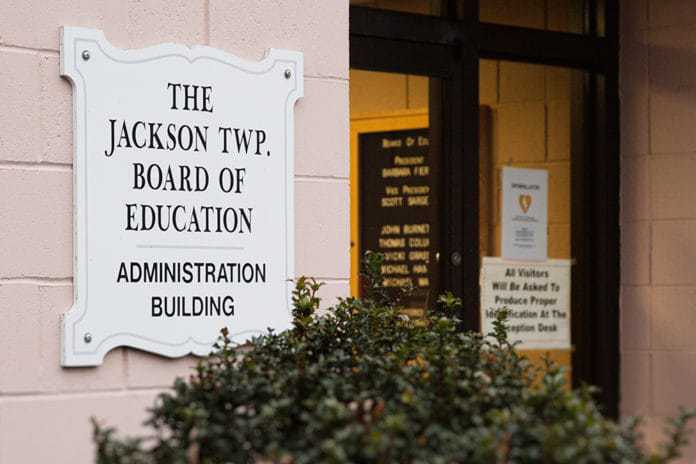Jackson The upcoming Jackson Board of Education meeting will have a fresh face. Last year, the New Jersey Department of Education ordered Dr. Alfred Savio to take on the role of state monitor for the school system.
Savio will succeed former State Monitor Carole Knopp-Morris, as per an agreement signed on April 14 with the local school district that must cover his salary.
Morris reversed the township Board of Education’s decision to reject the proposed budget after they voted down a 9.9% property tax hike last year. The Sylvia Rosenauer Elementary School was sold as part of that financial strategy in order to balance the budget.
Morris had previously said during a Board of Education meeting that the Jackson School District’s revenue issue—which BOE members and administrators claim was brought on by the state’s unfair allocation of school aid—was more pressing than its expenditure issue. Morris nevertheless supported that property tax increase, overriding the board’s decisions.
Assemblyman Alex Sauickie of the 12th District stated at the time that the state had caused the issue with its financing formula and had now intervened and overruled elected leaders who had refused to close a school or raise property taxes for Jackson homeowners.
More Pay for the New Monitor
With no vacation, holiday, or fringe benefits, Savio, who lives in Northfield, will be paid $125 per hour, up to a maximum of 32 hours per week. Compared to his predecessor, this indicates a pay raise for the role.
Under the terms of Morris’s first contract, which ran from January 23 to January 22, the state-designated monitor fee was $96 per hour for 849 hours, or $81,504 in total.
Morris departed the district in April 2025, and Savio started in May 2025. The second contract period started on January 23, 2025, and ran through December 22, 2026. The state-designated monitor rate under that contract was $125 per hour, which was the new rate for all state monitors.
Morris received $27,500 for the 220 hours she worked during that contract period at the $125 rate, making $109,004 the total amount she was paid while working for the district from January 2024 to April 2025.
Savio’s contract pays $125 per hour, which is the same as Morris’s most recent contract (the state-designated figure). His responsibilities are still the same; he oversees the township school district’s finances to make sure that all essential corrective measures have been taken and that the Jackson School District has regained the local capability and financial controls it needs.
Mike Yaple, a spokesman for the Department of Education, also told The Jackson Times that all state monitors receive the same hourly wage. The hourly rate went raised from $96 to $125 in 2024. When the state monitor contract is renewed, the revised hourly wage increase will go into force. This general rate adjustment, not a change in responsibilities or schedule, is reflected in the pay adjustment.
Commissioner Kevin Dehmer of the New Jersey Department of Education has the power to decide when the State Monitor is no longer needed to supervise the financial administration of the school system.
Savio’s Agreement
The Savio contract went into effect on May 19 and will run until May 18, 2026, or when the Commissioner decides an earlier date that is consistent with the deal.
According to the contract, the State Monitor is responsible for overseeing all business office operations, including but not limited to creating monthly financial reports, approving all purchase orders, transferring funds from the budget, and paying invoices and claims.
Along with overseeing the creation and execution of the budget, Savio will also evaluate the effectiveness and necessity of the appropriations and resources included in the district budget and make any necessary reductions and reallocations to keep the budget balanced.
In addition, he will be in charge of all district staffing and have the authority to hire, promote, and fire workers. This includes, but is not limited to, recommending and supervising any sick-leave buyout or other retirement incentive program in response to the school’s redistricting and restructuring plan, as well as any reduction in the number of tenured employees or notices of termination for nontenured teaching staff.
Savio will also have the power to overrule a chief school administrator’s decision and a board of education vote on any issue pertaining to the district’s financial and personnel management; however, all State Monitor actions will be governed by labor, education, and employment laws and regulations, such as the New Jersey Employer-Employee Relations Act, and collective bargaining agreements that the school district has entered into.
In order to discuss issues that resulted in the appointment of the State Monitor and to give Board members education and training that addresses any shortcomings found in Board actions, he will attend all Board of Education meetings, including closed sessions, and meet with the Board in an open public meeting at least once every three months.
The State Should Take Over
Earlier this year, Sauickie and fellow Assemblyman Robert Clifton of the 12th District introduced legislation requiring the state to pay for the State Monitor’s salary. According to Sauickie, it is absurd that other schools with plenty of taxpayer money are allowed to spend with little to no control but the Jackson School District, which is unable to even satisfy the state’s own definition of adequate spending, must pay for a state monitor.
The Jackson Times was informed by Assemblyman Sauickie, That the Department of Education (DOE) of the Murphy Administration initially imposed a state monitor on the Jackson School District was ludicrous. This resulted from the terrible school funding formula known as Senate Bill 2 (S-2), which was implemented under Governor Murphy in 2018. It redirected taxpayer resources to urban schools while drastically cutting help to rural districts like Jackson.
After being neglected by DOE and left with inadequate funding, Jackson was had to take out a state loan for the first time, which led to the monitor assignment. Carol Morris, the monitor, did little more than publicly assert what Jackson already knew—that this is a revenue problem (lack of state funds), not a spending problem—but she never advocated for Jackson. However, after a 53% reduction in aid, taxpayers were forced to pay $160,000 annually for that confirmation, the congressman continued.
Sauickie continued, “Now, the DOE is assigning another monitor, at even greater cost, after the district was forced to close two schools, merge high schools, lay off teachers (resulting in 40:1 student-teacher ratios), cut AP classes, eliminate sports, and stop after-school busing.” This won’t help based on nearby districts, some of which have actually had two monitors at the same time.
To remedy this injustice, I have introduced two measures and publicly demanded the resignation of the Commissioner of Education:
- A3589 requires the state, not the district, to pay for DOE-appointed monitors.
- A5179 mandates monitors only for districts receiving 70% or more of their funding from state aid, like Newark City Schools, which get $1.3 billion annually, funded from the same parents of school districts outside of Newark getting destroyed.
Since its official introduction on January 14, the second bill has not been moved from its current position in the Assembly Education Committee. Assemblywoman Dawn Fantasia and Assemblyman Michael Inganamort, both from the R-24th legislative district (which includes sections of Morris and Warren counties) and Assemblyman Clifton, are co-sponsors.
He pointed out that the DOE is still failing districts like Jackson, Toms River, Plumsted, and Lacey, and they are being shredded to fund others. Under one-party rule, these bills won’t proceed, but we can introduce accountability this year with the election of a new governor and a shift in legislative leadership. The next governor should immediately dismiss the State Board of Education and the DOE Commissioner for failing Ocean County’s children and eliminate the political agenda that has been in place for the previous eight years.
State of District Suing
In an effort to balance its budget, the school district is selling Christa McAuliffe Middle School this year. Additionally, the district has sued the State of New Jersey, the New Jersey Department of Education, and the New Jersey Commissioner of Education in Superior Court, alleging that the district has been underfunded on a systemic and unconstitutional basis.












